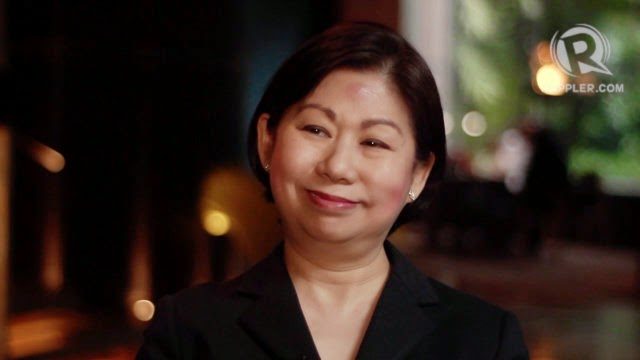SUMMARY
This is AI generated summarization, which may have errors. For context, always refer to the full article.

MANILA, Philippines – If the daughter of mall magnate Henry Sy would have it her way, she would rather be referred to as the SM Investments Corporation vice chairperson rather than “one of the most powerful women” in the Philippine business sector.
In a rare interview, Teresita Sy-Coson sat down with Rappler CEO Maria Ressa on the sidelines of the recently-concluded World Economic Forum (WEF) on East Asia held in Makati to talk about the prospects for businesses in the Philippines. This is in the midst of the country’s improving economy and the looming integration of Southeast Asian nations under the ASEAN Economic Community in 2015.
As the Philippines hosted WEF on East Asia for the first time in over two decades, the occasion also marked the first time Coson attended the event. It’s for a reason, she said.
“We (SMIC) are basically a domestic company so, we didn’t think that we’ll have to be a member here but right now, we’re here,” Coson told Rappler.
WEF gives policymakers and business leaders the opportunity to meet and set their agenda for the coming years.
Coson said her interaction with her fellow delegates could serve as an indication of a positive road ahead among businesses across the region towards an integrated ASEAN.
“I think right now, it’s more of awareness. The actual integration may come 5 years later, which is actually the original date of integration. Another thing that I see is that when the delegates of the ASEAN Business Advisory Council are together, it’s brotherhood. We are really… we’re very friendly to each other, we have a similar culture, so it’s actually very easy to assimilate,” Coson said.
More awareness on ASEAN needed
But Coson, who is a member of the ASEAN Business Advisory Council, which provides private sector feedback and sets key priorities for the implementation of the ASEAN Economic Community, admits that while there is excitement in the region for the upcoming integration, the sentiment has yet to reach the ground.
“Yes, it’s very true. Even here in the Philippines, a lot of us do not know the impact of ASEAN integration. And it is good for us that the other countries are just about in the same pace. So, we’ll all move the same pace in the sense that we’re going to the awareness first and then at understanding it, and really then working on the benefits of ASEAN integration,” Coson said.
With awareness still an issue a year before ASEAN countries jumpstart the establishment of a common market, Coson warned the government against opening up the market too soon.
“It depends upon how the government views the whole thing. If they’re going to move in the pace of our ASEAN neighbors, then there’s no problem. But if we’re going to go move much ahead, open up much earlier and not at the same pace, then I think some businesses will be affected,” Coson said.
Prospects for SMIC
In 2012, SM opened its 5th mall in China. Two years later, the country’s largest mall group is planning to double the number of their malls in China to 11 over the next 5 years.
Asked whether SM is planning to venture out to ASEAN countries, Coson said it is a possibility but at the same time, she would also like to invite other ASEAN investors to come to the Philippines.
One area where SMIC, which owns Banco de Oro, would likely expand in the region is banking. “We have to go out because we have to have that connectivity in terms of the financials requirement and transactions. So, in the bank we have to go out and we have to scale up, because right now, we’re very small. And, we’re trying to convince the government to make it easier for us to grow,” Coson said.
In other areas, SM is looking at integrating residence buildings with malls to “capture the synergy” of modern living.
As the region moves toward a common market, how will SM adapt?
Coson said: “The business will evolve as we have evolved before from a shoe store to what we are today. I don’t think we planned it that way, but it was just the evolution of investing, re-investing, and just keep on rolling and believe in the country. Believe in really distributing your network nationwide and going to the depth of the business in the consumer industry. With that, I think it has given us this benefit of being what we are today.”
While SM has evolved as a company over the years, Coson said the objectives of the conglomerate, which started out as a family-owned business, has remained the same in the midst of a globalized world.
“No, we still believe very much in investment here. I think we are basically a Philippine-based company that will be going abroad,” Coson said.
True enough, her message to our ASEAN neighbors is: invest in the Philippines. – Rappler.com
Add a comment
How does this make you feel?
There are no comments yet. Add your comment to start the conversation.